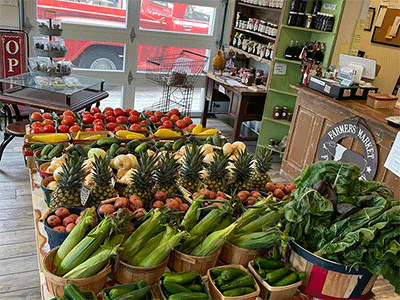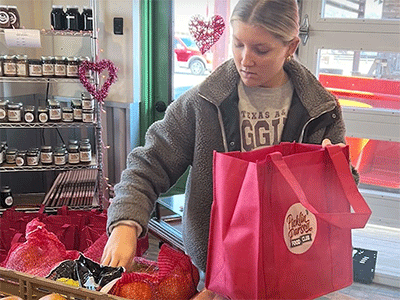In East Texas, many families struggle to access fresh fruits and vegetables due to a lack of grocery stores and farmers markets in the area and rising food prices. This is known as a food desert, and it can have serious consequences for the health and well-being of those who live there. However, Rev. Stan Copeland, senior pastor of Lovers Lane UMC who grew up in East Texas, and his nonprofit Colinas Way, are working to change that.

Lovers Lane United Methodist Church is a part of the North Texas Annual Conference.
“During the pandemic we started providing fresh produce in our feeding ministry at Lovers Lane and now we partner with the North Texas Food Bank. Between three sites, we provide fruits and vegetables to 3,000 people every week,” Copeland said. “I saw how Lovers Lane funded this and saw how appreciative people were of having fresh food that they can actually cook and prepare themselves. So, I started thinking in terms of what could the food ministry be like in my hometown.”
Copeland approached the five food pantries in eastern Henderson County to determine if there was a need, and the Picklin’ Parson Food Club in Chandler, Texas, was born. They launched a partnership with the Stillwater Farm Market Store and area food pantries to provide fresh produce to residents in the area. After distributing wooden tokens and flyers through those food distribution locations for two months, they began signing people up for a weekly food club based at Stillwater Market Store. For $2 a week, participants can buy $25 worth of produce of their choice. The original agreement was for 150 families; today, there are 266 households in the program.

The Picklin’ Parson Food Club is addressing food insecurity for residents who must often choose between medicine and gas or food, while also granting people autonomy. Copeland noted: “We call it a dignity model because they’re actually paying for the food even though they pay a minimal amount, and they’re able to choose, instead of us choosing for you. This allows them to buy what their family wants to cook and eat or the fresh fruit they’d like.”
“Every single day somebody tells me how grateful they are that this is in their community,” she said. “They know they're getting these fresh fruits and vegetables to help with their health. The impact that I know this is making is huge.”
While the program has only been in operation for five months, Guerin is already hearing stories of people saying their doctors are seeing great results from their bloodwork and exams and an overall improvement in people’s health with the increase in fresh fruits and vegetables.
“A lot of our community is older and living on social security, and with inflation and the price of groceries, it’s hard for them to get what they need,” Guerin said. “It’s so nice they can come here to Stillwater Farms. Most food pantries are once a month or twice a month and we’re once a week, so that makes it wonderful. I look forward to coming to work every day because I know when people come in here, when they leave, they’ve got a smile on their face.”
excerpt from a story by Monica Frazier, Communications Coordinator, North Texas Annual Conference
This story represents how United Methodist local churches through their Annual Conferences are living as Vital Congregations. A vital congregation is the body of Christ making and engaging disciples for the transformation of the world. Vital congregations are shaped by and witnessed through four focus areas: calling and shaping principled Christian leaders; creating and sustaining new places for new people; ministries with poor people and communities; and abundant health for all.





